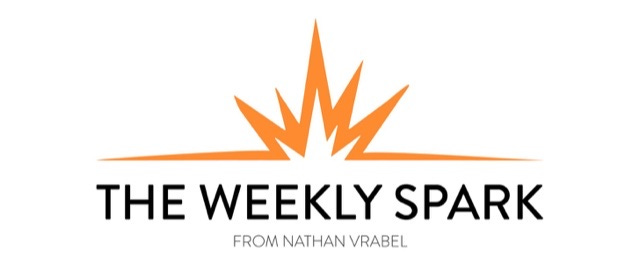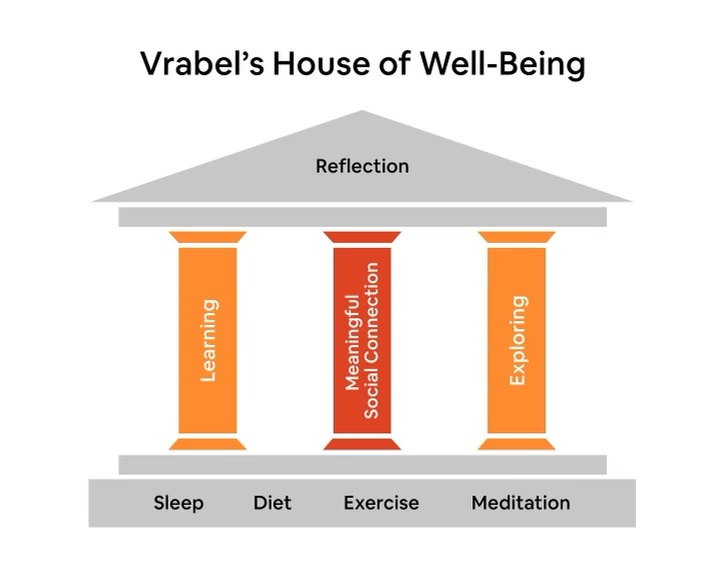Weekly Spark #246: On Purpose LIVE with Jay Shetty
Welcome to The Weekly Spark, my weekly newsletter featuring insights on mental and physical wellness, intentional living, and personal development. Since September 2020, I’ve published 246 reflections hoping to motivate myself and others to live more thoughtful, purpose-driven lives.
This past week, I attended Jay Shetty’s On Purpose speaking tour in Philadelphia. I found it moving and super interesting. For those who don’t know, Jay is a podcaster, author, entrepreneur, and former monk who has made waves in the health, wellness, and personal development space through his work. After business school, he spent three years living as a Hindu monk in India and the UK, embracing a simple lifestyle and meditating upwards of 8 hours a day. Ultimately, he found his calling to share his thoughts and perspectives through his On Purpose podcast, books, and business ventures. I had little prior exposure to Jay’s work but thought his messages were thought provoking and the the passion/energy in the crowd was incredible to witness; think of 3,000 people packed in a concert hall focused on personal growth and reflection, with a few sharing their vulnerable thoughts live on stage. It was moving. I’m here to share some of my key takeaways, which I think anyone can benefit from.
Jay talked a lot about how we process and think about what other people think of us. At times, we are silenced by ourselves because we cared what someone else would think of us or how they would judge us. How sad is that? What did we miss out on? In a time period where you are essentially conditioned (particularly by social media, if you participate) to place an undue amount of value of what people think of you, he talked about how the key is not actually what others think about you; it’s about what you THINK that they think about you. Think about it. If I walk around and create a narrative in my head that Johnny thinks that I’m ugly and stupid; I’m going to feel down about myself and feel emotional and physical pain as a result. However, if I walk around and think that Johnny thinks that I’m a nice guy, intelligent, and whatever other positive adjective you’d like to insert, I’ll feel far better. In either scenario, I have NO idea what Johnny actually thinks of me, but who cares? Most times, I’ll never end find out! We often cause ourselves inordinate amounts of pain and distress simply by thinking that others view us unfavorably or negatively; oftentimes they don’t, and we are self-inflicting that pain. This is an easy win for us; believe others are thinking positively of you, because they either are or in fact, they aren’t even thinking of you at all (Spotlight Effect - people think about you FAR less than you think that they do).
Another powerful line from the talk: it’s impossible to be successful in the business of pleasing everyone; if you are successful, you almost certainly won’t be pleasing yourself. Think of people that you know that are people pleasers. Think of people that you know that crave being liked by everyone. Oftentimes, in my experience, these are the people that are the most insecure. It’s an empty pursuit. Something is missing on the inside and they’re deeply dissatisfied with something about themselves, so they’ll use those tendencies to fill the void and ultimately feel validated. It’s empty validation because at the end of the day, they still have to go home with the same person that they’re dissatisfied with: themselves. This is where deep personal work enables you to own your shortcomings, failures, insecurities, and things that make you feel small. By doing so, you can find the levers that you need to make yourself feel whole and satisfied, and ultimately deliver a better, more confident, complete, and secure version of yourself to others.
Given that this was my first prolonged exposure to Jay, I was interested in learning more about some of his philosophies, so I tuned into his recent On Purpose podcast titled “7 Harsh Truths I Wish I Knew in My 20’s”. I’ll say that many of his truths seemed to be geared towards romantic relationships, but you can certainly apply the concepts anywhere. A few of my notes below:
The less you say, the more your words matter - While many people seek to be loud and heard, being quiet is a strength because you can listen, be interested in others, and ask good questions. Once you do decide to open your mouth and speak, it’s valued because you haven’t diluted the quality of your thoughts by over sharing and inundating others with your thoughts.
Let go before it drags you down - Let go or be broken by what you’re clinging to. The longer you carry something, the more it weighs you down. What’s the worst thing that happens if you let go of the things that are preventing you from being happier, healthier, and a truer version of YOU?
Talk to your partner, not about them - No matter the relationship, talk about your problems with the person you have the problems, not outsiders who can’t even fix it. People love to gossip. They love to share their “issues” with others because it creates attention and at times sympathy. People find a unique pleasure in having others feel bad for them. A confidence crisis leaves people seeking a disproportionate number of insights and outside validation. Keep it in house.
Understand the whole person, not just when they’re at their best - This was actually really interesting. You might think you know people, but you really don’t know them until you’ve seen them on a bad day, when they’re struggling, when they’re not on top of their game, when something bad happens to them, etc. Real character shows up in challenge and struggle. Pressure doesn’t create cracks it exposes where they already were. You want 360 degree exposure. So, if you want to really get to know someone, whether dating, business partners, friends, or whatever: make sure you go to a restaurant with notoriously bad service, and maybe have someone spill a drink on them before having their tires popped in the parking lot; then you can see how they handle those types of situations :)
You get what you accept, not what you deserve - Deserve is a feeling; acceptance is a standard. If you don’t protect your peace, no one else will.
People cling to the old you because they could control you - “Man but remember when we used to do this?!” “Yeah bro, that was 10 years ago.” Growth threatens those who benefited from your weakness. It’s also a mirror that reminds people of their lack of growth. A 2022 survey showed 58% of people felt uncomfortable when a close friend or partner leveled up in their life because it reminded them of their lack of growth. If you’re growing, don’t shrink and don’t stop flying; someday, others may decide to fly with you.
“Bad at texting” means not a priority - I think he was talking about people who are non-committal, who ghost people from dating apps, and who are finding excuses for why they don’t want to date someone. Lol. I’m trying to translate for the general population. I’m also 27 so I don’t view texting the way a 20-year-old might and I would never want to be labeled as “good” at texting. I have empathy for other’s situations, so I would never judge a person by their texting habits, especially someone who I know their values. Again, I think Jay might’ve been ghosted or avoided a time of two in his 20’s dating life which inspired this one 🤣 His points about people making effort for who they value, and actions are the only real language you can trust are most certainly valid, but I would certainly apply them across a broader spectrum.
Mental Diet
📚What I’m Reading: The Courage to Be Disliked: The Japanese Phenomenon That Shows You How to Change Your Life and Achieve Real Happiness by Ichiro Kishimi & Fumitake Koga
🎧 What I’m Listening to: On Purpose: 7 Harsh Truths I Wish I Knew in My 20’s
Quote of the Week:
“Those who love peace must learn to organize as effectively as those who love war” - Martin Luther King Jr.
I hope you enjoyed reading as much as I enjoyed writing. If you are enjoying The Weekly Spark, please share with a friend, family member, or coworker who you think might benefit. If you have thoughts, comments, or feedback, please reply to this email and share them; I’d love to hear from you! Until next time… Take care of yourself and take care of each other. 🙏
Nathan






